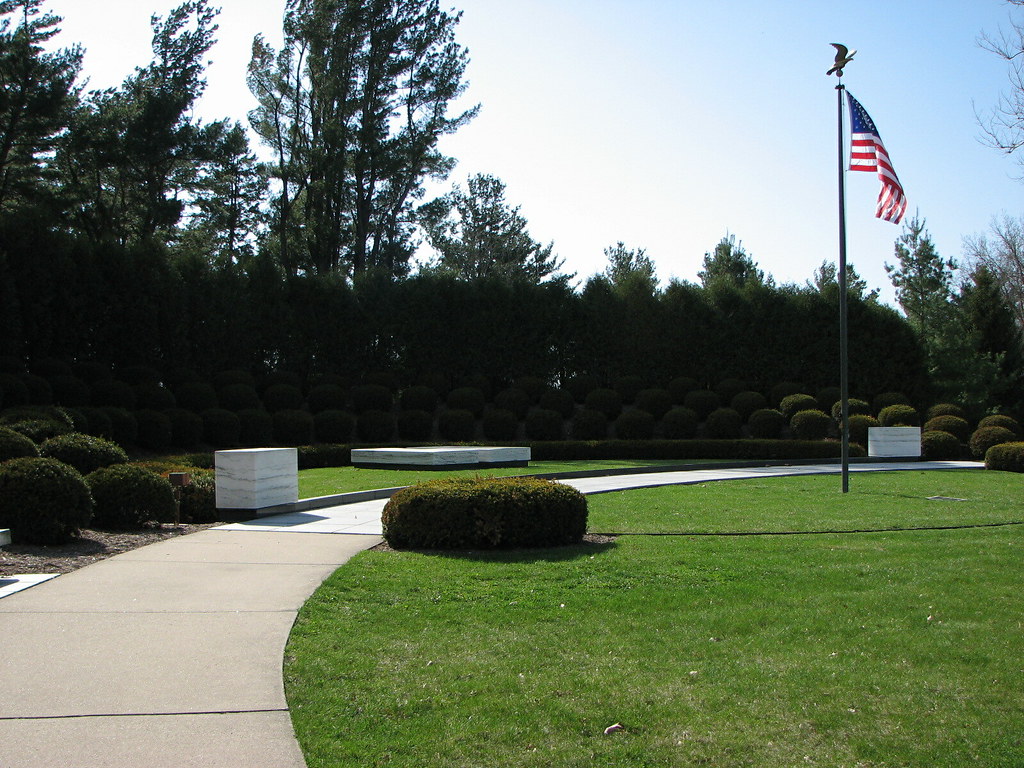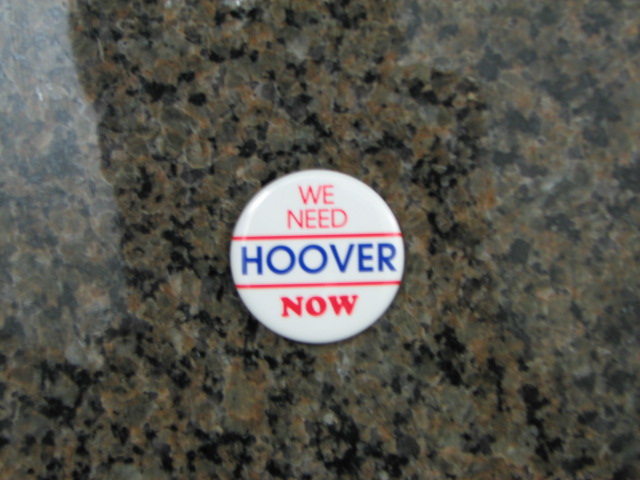Friday, April 24, 2009
Finding Herbert Hoover
With an afternoon to kill in Iowa City, the TH Teenager and I decided to check out the Herbert Hoover Presidential Library and Museum in nearby West Branch. Hoover, it seemed to us, was newly relevant.
It is a fascinating afternoon, and you find yourself hurtling along Interstate 80 through Iowa I strongly recommend stopping for a while at the site. Hoover was born in West Branch, traveled the world accomplishing engineering and humanitarian marvels in an unbelievably brilliant pre-presidential career, and then returned to West Branch after his death to be buried there along with his astonishing wife, Lou Henry Hoover. Their graves are a few hundred yards from the house in which he was born and the Quaker meeting house in which he worshipped as a child. The museum and library sit in the middle.
I do not propose a long dissertation on Hoover -- just visit the place, or read the biographical bits inside of Amity Shlaes' excellent The Forgotten Man: A New History of the Great Depression -- but I was struck by the relevance of Hoover's warnings for our own time. Along with the obligatory Herbert Hoover presidential shot glass -- you know you want one -- I bought a coffee mug with a sarcastic warning from Hoover from 1936 that resonates today:
And, yes, I do intend to wear the replica campaign button around town...
I'll report on any particular reactions.
Judging from the books available in the museum's bookstore, Herbert Hoover could use a new biographer. Amity Shlaes did a great job in a chapter, but his pre- and post-presidential accomplishments were so extraordinary that he deserves a much warmer home in our historical memory. It is a shame that Stephen Ambrose did not take up the task. Hoover needs somebody who writes as well.
9 Comments:
By , at Fri Apr 24, 10:48:00 PM:
I've been reading The Forgotten Man, in part because of your recommendation. Herbert Hoover got a raw deal from historians.
My daughter is in 8th grade ... she's beeing taught that Hoover was a bad uncaring man, that FDR walked on water and that the Great Depression was solely caused by margin speculation.
Link
By Christopher Chambers, at Sat Apr 25, 12:38:00 AM:
He's forgotten for a reason. he was the wrong guy, at the wrong time.
And let's not forget his refusal to quash lynching despite repeated pleas from Walter White of the NAACP (instead J Edgar's new FBI went after tha NAACP as subversive, and folk like Dilinger whilst he left the Mafia to grow into the terror it became, unfettered), or the hellish treatment he (and MacArthur) gave the Bonus Army. It was the last time US Cavalry ever advanced with sabres drawn--on their own comrades who were poor, dispossessed and, interestingly, intermingled (against the law) with poor black families on the Anacostia River shoreline.
I know you're deep in the throes of older white male derangement mode, but please, speak no voodoo to raise HH from the dead. Zombies are not what's needed, and only assholes wear Hoover buttons. Next thing you'll be showing your son the Joe McCarthy and Roy Cohn "shrines."
By Gary Rosen, at Sat Apr 25, 02:12:00 AM:
Why should we believe anything you say, Chrissy? You lied about Danny Pearl - you never answered Escort81 in that other thread. That's because you don't have the honesty or the balls.
By TigerHawk, at Sat Apr 25, 05:11:00 AM:
One of the documents on display at the Hoover museum is the written order authorizing the use of the Army against the marching veterans. It certainly seems as though McArthur went beyond the instructions, or at least pushed them to the edge, which turned out to be something of a habit for him.
The Hoovers also broke down various racial barriers. Lou Henry Hoover was the first First Lady to entertain a black woman as her guest in the White House (the wife of a black Congressman elected from Chicago) and caught huge grief for it.
Anyway, nobody is defending his presidency. Outside of the presidency -- both before and after -- he was one of the greatest Americans of the 20th century.
By , at Sat Apr 25, 06:20:00 AM:
In the Metro Club in Washington, there's a picture of Hoover, who was a member, and it simply says, "Hebert Hoover. Engineer."
Hoover is worth being remembered as a great American if for no other reason than the lives he saved in Europe after WWI. As a president, well, . . . .
Another president who is forgotten but becomes increasingly interesting to me as I suffer from "older white male derangement mode" is Coolidge. He, too, is just a bit different than the view given in the modern "narrative."
By GreenmanTim, at Sat Apr 25, 03:11:00 PM:
Say what you want about the man, but he was a helluva fisherman.
http://www.amazon.com/Hoover-Fishing-President-Portrait-Outdoors/dp/0811700992
By , at Sat Apr 25, 03:24:00 PM:
I grew up near Cedar Rapids and am now a history prof far away. I like to visit the Hoover Library when I get back that way, if only--and I suspect this is true of most presidential libraries and museums--because a thoughtful person must be impressed at the vagaries of life's trajectories that end up with that particular person in the White House, and of how difficult is the job.
What brings tears to my eyes every time in West Branch is the display of canvas sacks that went to Europe holding American wheat during WW I. There, Belgian women took their needlework skills to embroider those sacks in a multitude of beautiful ways, all bearing the message, "Merci, Hoover; Merci, USA," and found ways to return those to Hoover's office. Hoover accomplished many impressive things during his lifetime, but none finer than running our humanitarian assistance programs during and after the war.
By TigerHawk, at Sat Apr 25, 06:31:00 PM:
Anon 3:24: So true. That is a beautiful bit of curating.
As it turns out, Hoover's political philosophy is not far from mine -- he was a huge believer in human potential and individualism, but believed that every capable person had an obligation to give or volunteer to help those less fortunate. He was the anti-thesis of the statists who want government to absolve individuals of their own moral obligation to do what is right. I believe that he was the American president who was greatest in his non-presidential life, with the possible exception of a couple of the Founders.
By , at Sat Apr 25, 06:47:00 PM:
I don't know that anyone would have done any better/worse than Hoover. Hoover is judged with benefit of hindsight. At that time, in the entire history of the USA, the Government had not intervened in the business cycle. The economy was always left to repair itself. Based on that kind of precedent, I can see why he was slow to react. Later, he tried to do a lot things to help turn the economy, but balancing the budget was sacrosanct with Congress and any spending initiatives required a corresponding tax increase. In my opinion, from what I have read about the early 30s, dems were more conservative than conservatives are today. It was a different time.








